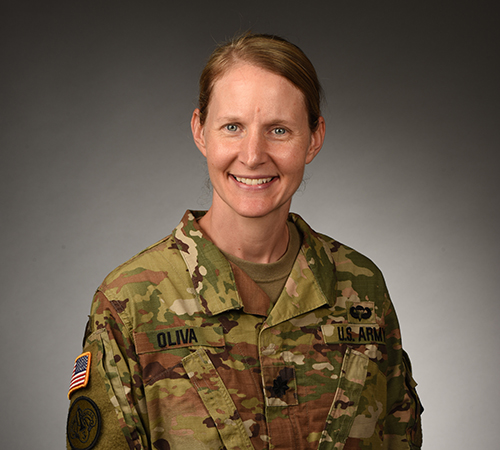Holding students to a high standard
Loyola’s first female professor of military science prepares cadets for success
Lt. Col. Ammilee A. Oliva brings nearly 20 years of military experience to her role as the department chair and professor of military science at Loyola.
Oliva commissioned into the Army in 2001 from the Reserve Officer Training Corps (ROTC) program at Northeastern University in Boston, Mass. She was deployed to Iraq in 2003 and to Afghanistan, where she served as an intelligence officer, in 2009. Oliva holds a masters degrees in Management and Leadership from Webster University and Military Arts and Sciences in Theater Operations from the School of Advanced Military Studies (SAMS).

Oliva, who looks forward to growing the ROTC program at Loyola, worked as a brigade deputy commanding officer and battalion executive officer prior to coming to Loyola in July 2018. Loyola magazine recently spoke with her about her plans to expand Loyola’s ROTC program and how she will prepare her cadets for success.
What made you want to join the military?
My dad was drafted in Vietnam, and both of my grandfathers were in the Navy and served in World War II, so the Army seemed like it might be a natural fit for me. By the time I was a sophomore in high school, I knew I wanted to join the Army in some capacity, but I also planned to go to college. I started looking into ROTC programs. I was heavily influenced by my older sister, who was a year ahead of me in school and applied for an ROTC scholarship. The ROTC program seemed like a great way to pay for college and stay physically fit and well-disciplined. So when I went off to college, I decided I wanted to join the ROTC program. I earned a three-year scholarship, which paid for my schooling and earned me an active-duty commission into the Army.
When did you consider taking a role at a university?
Working at a university always seemed like a great option, but I was never sure it was something I wanted. However, early on in my Army career I knew I wanted to be a professor of military science at a university. I learned a lot about how not to be a professor of military science when I was a cadet, and I always thought it would be great to give back and be the teacher I wish I had had.
What drew you to Loyola?
Growing up Catholic, I found Loyola very appealing as a Jesuit university with a focus on service. Loyola was my first choice because it was a small, Jesuit, liberal arts school in a great location. I feel fortunate to have been selected for my first choice from the 80 options on my list.
What do you hope to achieve as department chair and professor of military science?
During my time as a professor of military science, I hope to nurture the cadets who dedicate themselves to succeeding in the program and mold them into highly-qualified Army officers. I walked into an amazing ROTC program with great co-workers and dedicated cadets. My predecessor here loved his job and really set me up for success. ROTC is a demanding additional workload for the cadets, and this program isn’t for the faint of heart.
I learned after starting at Loyola that I’m the first female professor of military science since the ROTC program started in 1952. At a school that is majority women, I see this role as a great opportunity to bring more females into the program.
This is such an exciting time for females in the Army, because they now have every branch open to them. I chose military intelligence as my branch because it was fairly female-friendly, but now a female can be infantry or armor if she desires. It takes the right type of woman to want to do those jobs. My hope as the professor of military science at Loyola is to grow and develop the female students who decide to join the program and make sure they know every option is open to them.
What advice would you give to an ROTC Loyola student before they enter the real world?
I always remind my cadets that they are held to a higher moral and ethical standard than the average college student. When high moral values and ethics continue to be part of their daily lives, when they leave Loyola and lead others, their character and values will guide them through tough times, allow them to overcome hardships, and develop subordinates with similar values and ethics based on the command climate they set.
What are the distinct benefits of a Jesuit, liberal arts-based education when it comes to students pursuing a career in the military and/or as a civilian?
The Jesuit value of cura personalis fits perfectly within the mold of serving as an Army officer and training in the ROTC program. The idea of developing the whole self is crucial in becoming a successful leader—both within and outside of the military—and especially when serving in a diverse and ever-changing atmosphere. In the Army we hold our officers and soldiers to high ethical and moral standards. Students studying at Loyola are held to similar high standards, so the liberal arts-based education and leadership training share many of the same goals.
What is something your students don’t know or would be surprised to learn about you?
I think one of the greatest compliments I have ever received from junior soldiers is how easy it is for them to talk to me. I want students to know that I am completely approachable, willing to listen, and I really want to help them succeed. Even though I’m a lieutenant colonel and I wear an Army uniform, that shouldn’t deter anyone from talking to me about the ROTC program, their goals, or their problems. Like every professor on Loyola’s campus, I am here to help.